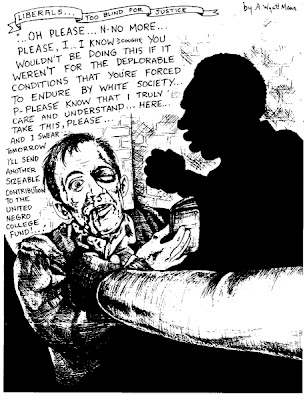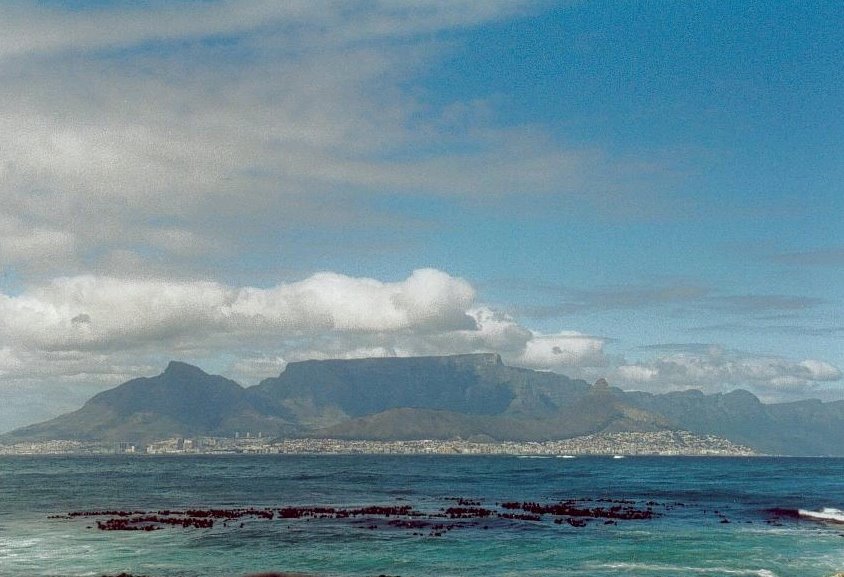If there were ever to be a contest for the most politically-incorrect letter ever published by a major newspaper, then this is the one which surely must win.
Aside from its content, there are several very intersting things about this letter. The first of course is, to our PeeCee-ingrained sensitivities, its almost naively earnest honesty. Galton realised (as has been conclusively proved since) that Africa is wasted on the Africans and it was (and still would be) a brilliant idea to populate Africa with hard-working thrifty Chinese colonists. If Galtons suggestion had been taken up, one can be sure that today Africa would be a much better and safer place, it would be exporting food and would not have become the worlds biggest and filthiest begging bowl.
Another remarkable thing, especially when one considers the chaotic conditions in China at that time, is Galton's obvious respect for the many good qualities of the Chinese people. If Galton were a blindly bigoted racist (which no doubt today he would be considered to be) you would expect him to look at conditions in China and dismiss them as "a useless race" much as we do today (and Galton did back then) with the Africans (and the Arabs too, hehe..!). But Galton was smart enough to realise that the poverty of the Chinese was a result of poor governance and not something innate in the Chinese character. Of course it is worth noting that, although his letter doesnt make it clear, he presumably wasn't promoting Chinese administration in Africa - such matters being best left to British colonial overseers. And, considering the phenomenal successes of Hong Kong and Singapore who can say he was wrong?
Another thing to remember is that in 1873 (aside from South Africa) European control was limited to a few coastal enclaves. This was written 11 years before the BerlinCongress of 1884 decision to carve-up Africa amongst the major European nations in order to (hopefully as ever) bring the benefits of European civilsation to the Dark Continent.
Africa For The Chinese. (June 5 1873)
To The Editor of The Times.
Sir, - In a few days Sir Bartle Frere will return to England, and
public attention will be directed to the East Coast of Africa. I am desirous of availing myself of the opportunity to ventilate some speculations of my own, which you may, perhaps, consider of sufficient interest to deserve publication in the Times.
My proposal is to make the encouragement of the Chinese
settlements at one or more suitable places on the East Coast of Africa a par of our national policy, in the belief that the Chinese immigrants would not only maintain their position, but that they would multiply and their descendants supplant the inferior Negro race.
I should expect the large part of the African seaboard, now sparsely occupied by lazy, palavering savages living under the nominal sovereignty of the Zanzibar, or Portugal, might in a few years be
tenanted by industrious, order loving Chinese, living either as a semi-detached dependency of China, or else in perfect freedom under their own law. In the latter case their would be similar to that of the inhabitants of Liberia, in West Africa, the territory which was purchased 50 years ago and set apart as an independent State for the reception of freed negroes from America.
The opinion of the public on the real worth of the Negro race has halted between the extreme views which have been long and loudly proclaimed. It refuses to follow those of the early abolitionists, that all the barbarities in Africa are to be traced to the effects of a foreign slave trade, because travelers continually speak of similar barbarities existing in regions to which the slave trade has not penetrated. Captain Colomb has written a well-argued chapter on this matter,
in his recent volume. On the other hand, the opinion of the present day repudiates the belief that the negro is an extremely inferior being, because there are notorious instances of negroes possessing high intelligence and culture, some of whom acquire large fortunes in commerce, and others become considerable men in other walks of life.
The truth appears to be that individuals of the mental caliber I have just described are much more exceptional in the negro than in the Anglo-Saxon race, and that average negroes possess too little intellect, self-reliance, and self-control to make it possible for them to sustain the burden of any respectable form of civilization without a large measure of external guidance and support.
The Chinaman is a being of another kind, who is endowed with a remarkable aptitude for a high material civilization. He is seen to the least advantage in his own country, where a temporary dark age still prevails, which has not sapped the genius of the race, though it has stunted the developed the of each member of it, by the rigid enforcement of an effete system of classical education which treats
originality as a social crime. All the bad parts of his character, as his lying and servility, spring from timidity due to an education that has cowed him, and no treatment is better calculated to remedy that evil than location in a free settlement. The natural capacity of the Chinaman shows itself by the success with which, notwithstanding his timidity, he competes with strangers, wherever he may reside. The Chinese emigrants possess an extraordinary instinct for political and social organization; they contrive to establish for themselves a police and internal government, and they give no trouble to their rulers so long as they are left to manage those matters by themselves. They are good-tempered, frugal, industrious, saving, commercially inclined, and extraordinarily prolific. They thrive in all countries, the natives of the Southern provinces being perfectly able to labor and multiply in the hottest climates. Of all known varieties or mankind there is none so appropriate as the Chinaman to become the future occupant of the enormous regions which lie between the tropics, whose extent is far more vast than it appears, from the cramped manner in which those
latitudes are pictured in the ordinary maps of the world. But take a globe and examine it, and consider the huge but poorly-peopled bulk of Africa, by whose side the areas of India and of China look insignificant, and think what a field lies there for the development of a suitable race. The Hindoo cannot fulfil the required conditions nearly as well as the Chinaman, for he is inferior to him in strength, industry, aptitude for saving, business habits, and prolific power.
The Arab is little more than an eater up of other men’s produce; he is a destroyer rather than a creator, and he is unprolific. The history of the world tells a tale of the continual displacement of populations, each by a worthier successor, and humanity gains thereby.
We ourselves are no descendents of the aborigines of Britain, and our colonists were invaders of the regions they now occupy as their lawful home. But the countries into which the Anglo-Saxon race can be transfused are restricted to those where the climate is temperate. The Tropics are not for us, to inhabit permanently; the greater part of Africa is the heritage of people differently constituted to ourselves.
On that continent, as elsewhere, one population continually drives out another. Consider its history as it extends over successive centuries. We note how Arab, Tuarick, Fellatah, Negroes of uncounted varieties, Cadre, Hottentot surge and reel to and fro in the struggle for existence. It is into this free flight among all present that I wish to see a new competitor introduced-namely, the Chinaman.
The gain would be immense to the whole civilized world if we were to out-breed and finally displace the negro, as completely as the latter has displaced the aborigines of the West Indies. The magnitude of the gain may be partly estimated by making the converse supposition –namely, the loss that would ensue if China were somehow to be depopulated and restocked by negroes.
The pressure of population in China is enormous, and its outflow is great and increasing. There is no lack of material for a suitable immigration into Africa. I do not say that it would be possible at any moment to persuade communities of men and women from
Southern China to establish themselves in Africa; but I am assured, by excellent authorities, that occasions of political disturbances frequently arise when it would be practicable to do so by the promise of a free, or nearly free, grant of land. The Chinese have a land hunger, as well as a love for petty traffic, and they would find a field in which to gratify both of these tastes on the East African Coast.
There are many Chinese capitalists resident in foreign parts who
might speculate in such a system and warmly encourage it. If once successfully started, it ought to maintain itself. The colonist could not starve; and when they began to succeed they would send money to their relatives to enable them to follow, just as they now do from the many other parts of the world where they are located. For these reasons it is probable that the streams of emigration from China have sufficient "head" to enable them to reach and overflow the coasts of Eastern Africa if they were watched and judiciously diverted in that
direction.
I have finally to speak of the political effort necessary to secure a free right of occupancy and of settlement at suitable points on the coast. No very serious obstacle seems to stand in the way; certainly none was met with when Liberia was founded. It is probable that as the success of such an enterprise would be of equally great value to all nations commercially interested in those parts, no national jealousy would be excited by its promotion, and the necessary territory could be obtained with little difficulty and at a small cost, to be advanced in the first instance as a charge on the land and hereafter to be redeemed.
Francis Galton
read more about this fascinating Victorian gentleman here






